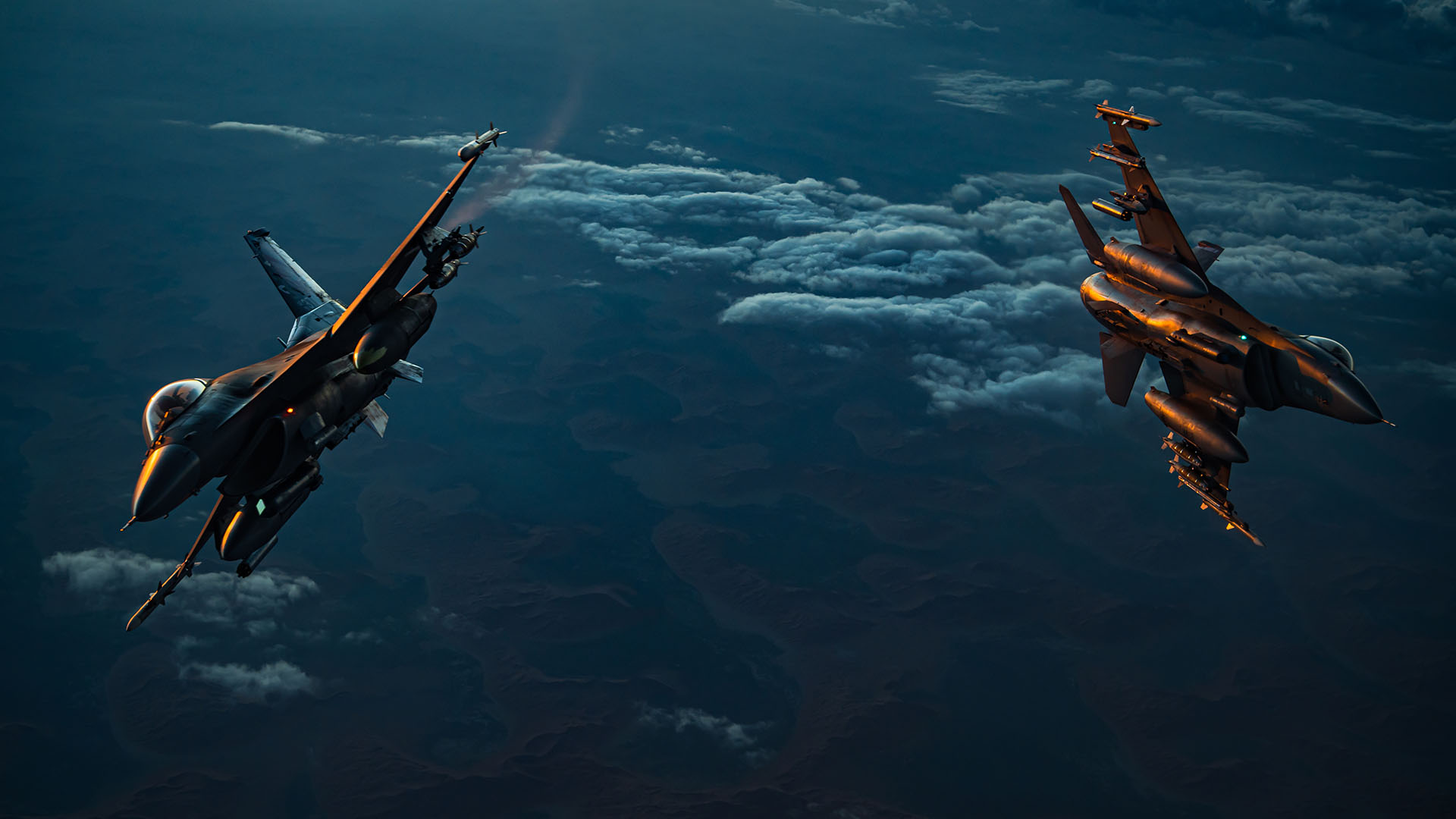

The U.S. military launched airstrikes on Thursday against two sites in eastern Syria in response to more than a dozen recent attacks on American forces in Iraq and Syria, Defense Secretary Lloyd Austin has announced. The targets were used by Iran’s Islamic Revolutionary Guard Corps, or IRGC, and affiliated groups, Austin said.
“If attacks by Iran’s proxies against U.S. forces continue, we will not hesitate to take further necessary measures to protect our people,” Austin said in a statement.
Since the attacks began on Oct. 17, a total of 21 U.S. troops have been injured, of which 19 were later diagnosed with Traumatic Brain Injury. An American contractor also died of a cardiac arrest while sheltering from a possible drone attack that turned out to be a false alarm.
Two U.S. F-16s struck weapons and ammunition storage areas near Boukamal, Syria, that were connected to the IRGC, the Associated Press reported. As of Thursday, the U.S. did not have a battle damage assessment of the airstrikes, a senior defense official told reporters.
The airstrikes are “separate and distinct” from the war between Israel and Hamas, Austin said in the statement. The strikes were solely meant to protect U.S. troops in Iraq and Syria and they do not indicate a shift in the U.S. approach to the ongoing Israel-Hamas conflict.
Subscribe to Task & Purpose Today. Get the latest military news and culture in your inbox daily.
Since Hamas launched its Oct. 7 terror attacks on Israel, U.S. government officials have repeatedly warned that Iran is trying to escalate the war by targeting American service members in the Middle East.
Between Oct. 17 and Oct. 26, U.S. troops in Iraq and Syria have been attacked at least 16 times by Iranian-backed groups, Air Force Brig Gen. Pat Ryder, a Pentagon spokesman, told reporters earlier on Thursday.
Of those attacks, twelve occurred in Iraq and the other four took place in Syria, Ryder said during a Pentagon news briefing.
The recent increase in attacks against U.S. troops in Iraq and Syria has “Iranian fingerprints all over it,” a senior defense official told reporters on Oct. 23.
“The United States does not seek conflict and has no intention nor desire to engage in further hostilities, but these Iranian-backed attacks against U.S. forces are unacceptable and must stop,” Austin said in Thursday’s statement. “Iran wants to hide its hand and deny its role in these attacks against our forces.”
The United States and Iran have long waged a proxy war in the Middle East. Both countries nearly came to open conflict in January 2020, after a U.S. airstrike killed Iranian Maj. Gen. Qasem Soleimani, the former head of the IRGC, Abu Mahdi al-Muhandis, the commander of Kata’ib Hezbollah, an Iranian-backed militia.
Iran responded by firing ballistic missiles at U.S. troops in Iraq. A total of 110 service members deployed to Al Asad Air Base were later diagnosed with mild Traumatic Brain Injury, of which 29 soldiers received Purple Hearts.
Thursday marked the latest U.S. airstrikes in Syria against Iranian groups since March 23, when the American military retaliated for a drone attack that killed an American contractor and wounded five service members.
Historically, such U.S. airstrikes have often failed to stop further attacks against American forces.
As with past operations against Iranian-backed groups in the Middle East, the U.S. military is describing Thursday’s airstrikes as “self-defense strikes.”
“The President has no higher priority than the safety of U.S. personnel, and he directed today’s action to make clear that the United States will not tolerate such attacks and will defend itself, its personnel, and its interests,” Austin said.
But Thursday’s airstrikes are not likely to deter Iran’s Supreme Leader Iran’s Supreme Leader Ayatollah Ali Khamenei because the Defense Department’s emphasis that they were meant to be a limited response drowned out the actual effects of the strikes, said Behnam Ben Taleblu, an Iran expert at the Foundation for the Defense of Democracies think tank in Washington, D.C.
“It’s likely Khamenei may flinch but stay the course,” Taleblu told Task & Purpose on Friday.
UPDATE: 10/27/2023; this story was updated with comments from Behnam Ben Taleblu.
The latest on Task & Purpose
- A guide to every beret worn by American service members
- Army general says moldy barracks are a ‘discipline problem’
- Best of the bad: What was the best C-ration during the Vietnam War?
- How rank and rate works in the Navy
- $1.3 billion in Army spare parts found in ‘critical’ shape, IG reports